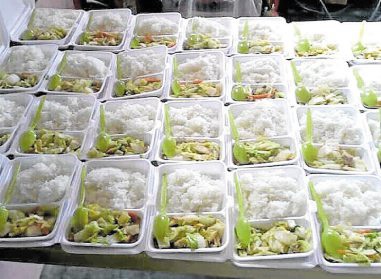
FREE AND HEALTHY For the past month, Puso Kitchen has given away over 10,000 vegetable meals to around 600 families in six barangays in the cities of Pasay and Parañaque. —PHOTO COURTESY OF SPECS FOUNDATION INC.
MANILA, Philippines — In the absence of aid from the national government, Mary Grace Ampo and her family have been relying on “Puso Kitchen” which has been supplying them and around 400 other families in four barangays in Pasay City with free meals using vegetables sourced from Cordillera farmers.
An initiative of Barangay Calawis councilor TJ Malvar in Antipolo City, Puso Kitchen is now being replicated in selected areas in Pasay and Parañaque through a program led by SPECS Foundation Inc., a nongovernment organization (NGO) which helps children who are at risk and suffering from malnutrition.
Ampo’s youngest child, 5-year-old Ken (not his real name), weighs only 10 kilograms and was diagnosed by a barangay health worker as severely malnourished. His two siblings aged 7 and 11 are also undernourished.
Their father used to earn P500 a day as a porter for a snack food company in Imus, Cavite. When the lockdown was imposed, all that he had left was P2,000 of his pay, but the money has since been used for their basic needs, leaving them dependent on their neighbors and the free meals provided by Puso Kitchen.
“We haven’t received any social amelioration program form or card. We are still waiting. They told us the poor would be given help,” said Ampo, a resident of Barangay 134.
Her family failed to qualify for the Pantawid Pamilyang Pilipino Program because she failed to secure the birth certificate of one of her children.
Teresa Coman, executive director of SPECS Foundation Inc. in Pasay City, said that Puso Kitchen has so far served 10,359 meals for the past four weeks to around 400 families in Barangays 156, 134, 135 and 184 as well as 200 families in two villages in Parañaque City.
The officials of these areas, with the help of a SPECS dietitian, cook the vegetables and distribute it to the families under their jurisdiction.
The NGO has also provided 1,700 vegetable packs consisting of 3 to 4 kilos each of carrots, sayote and other greens to families in the two cities.
The vegetables sourced from Cordillera farmers through the Department of Agriculture (DA) are sold to the foundation at minimal cost and delivered free of charge.
Coman told the Inquirer that the barangays were chosen because although most residents were from the “no work, no pay” sector, they had strong and dependable leaders who could implement the feeding program and possibly sustain it in the future.
“Most of the children in these areas are undernourished… And with the [new coronavirus disease] COVID-19, they suffer more… The purpose of SPECS’ Puso Kitchen is prevention; to encourage people not to look for food for their children and their family and just stay at home,” Coman added.“You can see our partnership help us all around. From the DA, we help farmers, consume their crops; at the barangay level, we empower our local government units, then the children and elders are given healthy food to boost their immune system,” she said.
Since the program began, Ampo said that she and Ken, who likes carrots, have already gained weight.
“Puso Kitchen really helped us, especially my children, since we don’t have any work. We have food. What’s even more important is that my kids are able to eat vegetables,” she added.
SPECS relies on funding from its realigned projects and donations from Germany for Puso Kitchen although it has just enough money to continue the program until the end of May. For more information on how to donate and make the project sustainable, visit its Facebook page.

